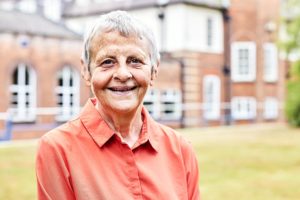Research Champion Wendy Mitchell
Research Champion and Sunday Times best-selling author Wendy Mitchell was diagnosed with young onset dementia at the age of 58.
onset dementia at the age of 58.
Wendy, who was an NHS Manager for 20 years until 2015 recalls: “I was coming out of my office one day and I didn’t know who I was or who all the people around me were. I hid in the ladies for a few minutes and then the fog lifted and I knew where I was again.”
She knew there was something wrong and after various tests, she was diagnosed with young onset dementia. After being told that there was nothing that could be done, Wendy went into a deep depression.
Research involvement
It was only when she began meeting other people with dementia that her eyes were opened to the idea of being involved in research. She signed up to Join Dementia Research and over time was invited to take part in a wide range of interesting studies.
The first research project she was involved in was the MADE study which stands for ‘minocycline in Alzheimer’s Disease Efficacy’.
Wendy explains: “I was trialling an antibiotic that was currently being used to treat people with acne. Researchers were trying to re-purpose it to see if it could help people with dementia.”
The study involved Wendy taking medication over a period of two years and meeting researchers to report any changes in cognition.
The results showed that the antibiotic did not significantly delay the progression of cognitive decline and functional impairment in people with Alzheimer’s disease.
About the study, she says: “Not every study will result in a breakthrough, but it is only through research that we will understand what works and what doesn’t.”
Wendy was also involved in the IDEAL study which stands for ‘Improving the experience of dementia and enhancing active life’. For this study she met with a researcher once a year and they asked questions about how her dementia had progressed and how she was coping with it.
The IDEAL study is still ongoing and the findings will help build understanding about what can be done in policy and practice to help people with dementia.
Becoming a Research Champion
Having taken part in several studies, Wendy was invited to be a Research Champion for Join Dementia Research. Through this role, she goes to events, speaks to people, tells them about the service and dispels the myths about what health and care research involves.
 Wendy says: “People are often hesitant about taking part in health research, but it’s important for them to understand that without people like them taking part, advancements cannot be made.
Wendy says: “People are often hesitant about taking part in health research, but it’s important for them to understand that without people like them taking part, advancements cannot be made.
“In my support group, I asked them: ‘How many of you would like to take part in research?’ and no one put their hand up. I then asked ‘How many of you would like to take part in changing the way dementia looks in the future?’ and they all volunteered!”
She goes on to say: “We can’t change the future unless people take part in research. Dementia strips away so much, and being able to take part in research just makes you feel that valuable part of society again. It gives you hope for a better future.
“I would encourage anyone who is considering signing up to Join Dementia Research to do so and experience the joy I have experienced from taking part in research.”
Writing about her experience
As well as being an inspirational Research Champion, Wendy writes a daily blog called ‘Which me am I today?.’ Not only does this enable her to remember what she has done the day before, it is an effective tool to raise awareness about what it’s like to live with dementia.
She says: “Initially it was my way of letting family and friends know I was okay – many of my friends are scattered around the country and although I’d lost my confidence on the phone, I can still write fluently, so a blog seemed to be the perfect medium to communicate with people.
“I hadn’t expected total strangers to be interested in my story, but my blog’s been read in 24 countries now! If it’s made a handful of people reconsider their vision of people with dementia then I’ll be happy. It’s also been a medium for me to promote and raise awareness of the different ways people can get involved with dementia and the work of Join Dementia Research.”
Wendy has also written two best-selling books since being diagnosed, Somebody I used to know and more recently What I wish people knew about dementia.
She has also appeared on national and international television including BBC Breakfast and ABC News Australia.
